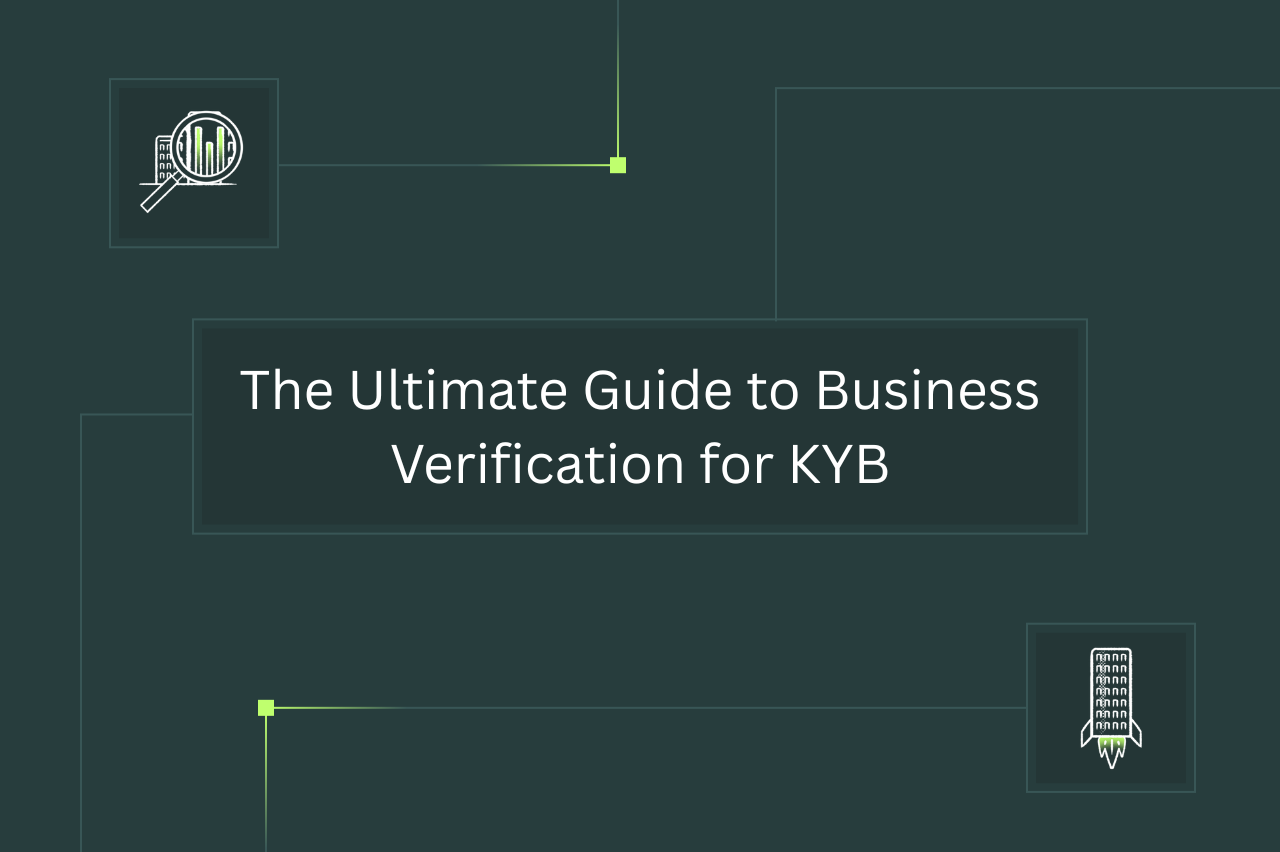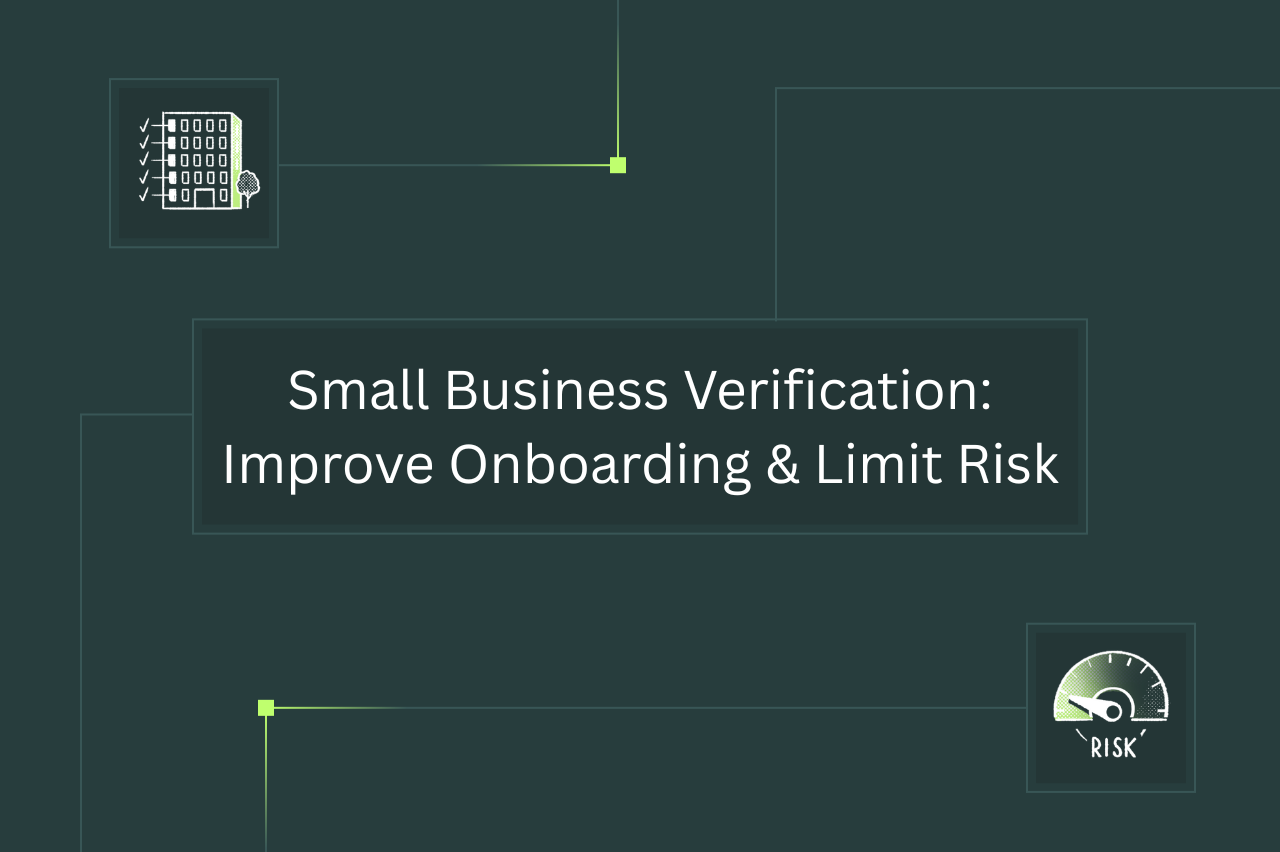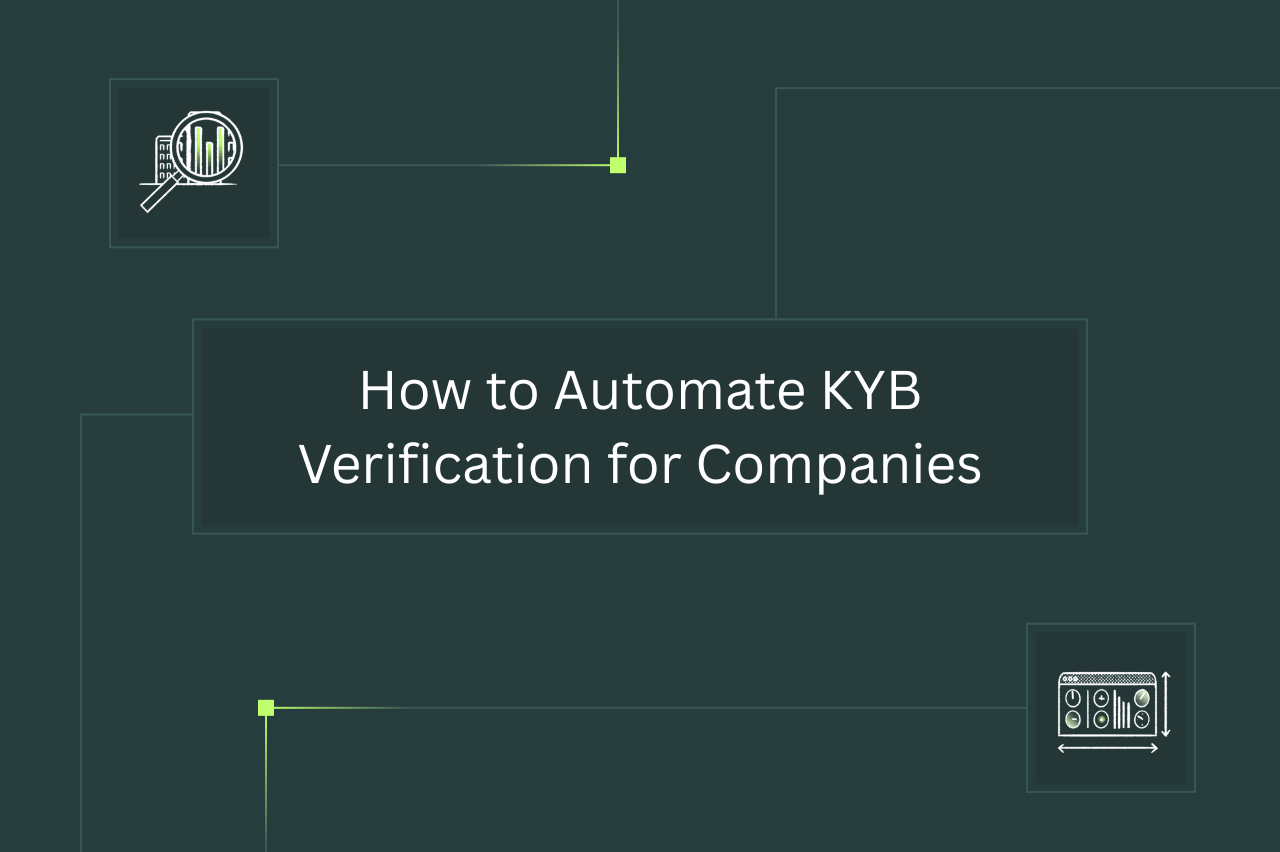In brief:
- Business verification services are software tools that help companies check whether businesses they want to onboard exist, are properly registered, and do not present unacceptable levels of risk. They mainly work by querying data from sources via APIs, and then matching that to input data.
- Business verification services are used by companies to make Know Your Business (KYB) faster and more cost efficient. They can automate repetitive tasks, pull data from various sources at once, and be customized to fit a company’s specific regulatory obligations or risk appetite.
- Signs of illegitimate businesses include missing or nonsensical registration information, difficulty with finding out who the business’s UBOs are, and mysterious transactions that aren’t properly documented.
Companies that want to work with other businesses as customers (or even partners) need to know who they’re dealing with. Does the business have any actual operations? Does it have the necessary documentation filed with applicable government agencies and regulatory bodies? Are its owners genuine individuals? Do the activities of the business and its owners point to a potentially risky relationship ahead?
Answering all of these questions is a tall task for a company to complete on its own, especially if it has to do so for every business it wants to work with. To conserve resources for the work it really wants to do, a company will often hire a third-party service to help with the business verification that it’s required to do by law.
This article explores what these services are, why specifically they’re used, and which ones are at the top of their class.
- What are business verification services?
- How business verification services work
- 5 benefits of business verification services
- Red flags to look for when detecting illegitimate businesses
- Top business verification features to look for in a solution
- 6 top business verification services to choose from
- Deep dive into a business’s identity with Middesk
First, let’s talk a little more specifically about what business verification services are, and why companies looking to onboard other businesses often turn to them.
Business verification services are software tools that specialize in gathering data about businesses and matching submitted information against official sources. The goal is to determine if a business is legitimate, and not involved in risky or illegal activity.
Why business verification services are important
When a company wants to take on another business as a client or partner, it needs to know exactly who it’s dealing with. That includes both the company itself as well as anyone who owns or is affiliated with it.
Parts of this are required by law. National and international regulations oblige companies to avoid dealing with companies or persons that have committed financial crimes in the past, or are presently (suspected of) committing financial crimes. Failure to follow these guidelines can result in grave consequences for a company, such as heavy fines and loss of reputation.
On the other hand, a company verifying a business that it wants to partner with or take on as a client is just good risk management practice. A company should want to ensure that it’s dealing with businesses that aren’t engaging in practices that could threaten its operations or bottom line, or that implicate it in criminal activity.
Unfortunately, the verification process takes a great deal of time and other resources to do manually. These are resources that a company likely can’t afford to waste, especially if it’s trying to onboard business clients and/or partners at scale. Using a business verification service helps a company speed up verifying a business, while also avoiding potential mistakes that come with performing verification manually.
Business verification solutions work mainly through APIs that query data from official sources – usually government agencies, credit bureaus, and other public information depositories. Queries can be done manually for one-time verifications, or automatically (sometimes through machine learning) if speed and scalability are needed.
A solution will then try to match the parameters a company inputs against the queried information. Some can also accommodate partial matches if a company or individual’s name is misspelled, used alternately, or in an alternate abbreviated format.
If a match isn’t found, the solution will produce an alert that may need to be manually reviewed. Sometimes this just involves an alternate spelling, abbreviation format, or name that will still check out upon requesting further information. Other times, it’s a red flag that the business under scrutiny isn’t to be trusted.
Even if a solution is brought on to help speed up or automate business verification, it’s still important for a company to have employees properly trained on how to use the solution for manual review. That includes which approach to take to particular alerts, and why.
If you’re looking for a service that can automate this process for you with data you can put your full confidence in, see how Middesk Verify can help you in our demo below:
{{gated-content-block="/events/productdemo-verify-june-2025"}}
Why should a company hire a third-party service to verify a business instead of conducting the process in-house? As it turns out, there are several advantages to doing so. Here are five key ones.
- Data aggregation: One of the biggest challenges in verifying businesses manually is that all the necessary information isn’t always in the same place. In the U.S., for example, business information can be split between federal, state, and even county levels of government. Some may even be held by private businesses, such as credit bureaus. Business verification software can check all of these places at once so there isn’t a need to consult them one by one.
- Speed: Computers and artificial intelligence can process data much faster than humans can, which allows for matching or flagging many more business’ credentials in less time. This is important for bigger companies that need to onboard or check companies on a large scale.
- Automation: Automated business verification takes care of routine KYB checks without requiring manual intervention. This frees up risk and compliance staff to investigate suspicious cases, improve user interfaces, create new products, and so on.
- Error reduction: Another benefit of automating business verification is that it reduces the risk of human error. Data entry mistakes and subjective judgments can cause false positives or false negatives, which can lead to unnecessary manual reviews and other problems. Letting a computer handle business verification ensures the job gets done in by-and-large the same way every time.
- Customizability: Not every business has to follow the same regulations, or faces the same types or proportions of threats. Fortunately, many services for verifying businesses offer some degree of customization that allow a company to tune their parameters to fit specific regulations and other needs.
When verifying a business, a company might get one or more alerts that a piece of information is missing or doesn’t match up. Sometimes, there are legitimate reasons for these omissions or abnormalities – such as different spellings, abbreviation formats, or “doing business as” names not being recognized.
Other times, these alerts are signals that a business warrants further investigation, and may ultimately be too risky to deal with. Here are some common indicators that may point to a phony or nonexistent business.
- Fake or missing registration number(s): Most legitimate businesses have one or more government-issued ID numbers, such as an Employer Identification Number (EIN) from the IRS in the U.S. for corporate tax tracking purposes. If one or more of these numbers is illegitimate or missing, it could be a warning sign of a shady business.
- Fake or missing address: A business that has no physical presence could be a shell company; these are often used to illegally move or hide assets or liabilities.
- Lack of a proper privacy policy: As digital data management laws have been enacted, businesses have been required to disclose what information they collect from customers and how they handle it. To this end, a business that doesn’t have a privacy policy – or has a very poorly-written one – is one that should be treated with skepticism.
- Difficulty finding ultimate beneficial owners (UBOs): Businesses sometimes have complex organizational and/or financial structures that make it difficult to tell who actually owns the company. This could be a red flag, in that it might be intentional to hide business owners who are involved in shady dealings.
- Rapid and illogical transactions: A business may quickly move money back and forth between different bank accounts with no explanation or apparent reason for doing so. This is a red flag that the business might be involved in money laundering.
- Poor or missing transaction documentation: Similar to the above point, a business’s transaction records may not clearly explain why a transaction is being carried out. Or, in some cases, transaction records may be totally nonexistent. These are both red flags.
- Post-audit tampering: If a business has a history of making alterations to how its bank accounts work or are recorded after audits are conducted, that might be cause for concern.
Using a business verification solution should generate advantages and/or reduce resource costs for a company. So when assessing options, companies should keep these factors in mind.
Compliance
Though it might seem obvious, a business verification solution should be able to gather and assess all the information about a business required by industry and jurisdiction regulations. Ideally, this should be achievable with its default settings or very minimal customization. A company doesn’t want a solution that’s going to leave gaps in its compliance, but it also doesn't want one that’s going to be a lot of extra work to set up.
Security
Verifying a business often involves dealing with sensitive information. So businesses and their owners have a right to expect this information to only be used for its intended validation purposes. That means it should only be accessible to a select number of employees who will be working with it, and it should be well-protected against external breaches or theft.
Ease of use
Ease of use encompasses a few different aspects. On one level, it means a business verification solution’s user interface should be intuitive enough that the personnel designated to operate it should be able to do so efficiently. To that end, the provider should also have an accessible customer service team for answering questions and troubleshooting difficulties.
In addition, the solution should be easily integrable with a company’s existing systems. Again, a company doesn’t want to squander the time-saving advantages of using a computerized solution by picking one that takes extra time and money to fit into the company’s IT infrastructure.
Automation
One of the major points of using a software-based business verification solution is to be able to automate parts of the process – the more, the better. This frees up time for compliance professionals to be working on higher-priority cases or projects.
Customizability
A business verification solution should be able to be customized to fit a company’s needs. That includes not just a company’s industry-specific and jurisdiction-specific compliance requirements. It should also include information and functions that help a company deal with threats and challenges unique to the company’s situation.
One particularly notable customization feature is scalability. A solution should be able to grow with a company to accommodate more clients, and perhaps also shrink with the company to allow for conserving resources if it doesn’t need to verify as many businesses.
Cost effectiveness
Lastly, using a business verification solution should be worth the money a company pays for it. It’s important to look at pricing schemes – often measured per user; per business and/or piece of data verified; and/or per customization feature – but they don’t always tell the full story. A less expensive solution may not be the best choice if it doesn’t come with the features a company needs, or the extra work needed to set it up outweighs the speed advantages it offers.
To help you assess the options you have for a business verification service, our instructions for how to run a KYB vendor test can help you choose the right fit based on your needs.
{{gated-content-block="/insights/how-to-run-an-effective-kyb-vendor-test"}}
Based on the essential features of a business verification solution listed above, which companies are the power players in the field? Here are six that are mentioned frequently.
1. Middesk
Best for: Extensive business verification and risk assessment capabilities with data straight from government sources
Middesk’s Business Verification solution helps automate validating the identities of businesses and their owners. It automatically retrieved documents from all Secretary of State offices in the U.S., allowing for searching them all at once for business registration details. Its integration with Socure also allows for finding details about a business’s ultimate beneficial ownership.
In addition to basic details on a business like EIN database searches or TIN matching, Middesk also provides other useful information for evaluating accuracy and risk in a B2B relationship. This includes watchlist screening, industry classification, document copies, digital footprint, litigation, bankruptcies, and more.
2. ComplyCube
Best for: Extensive Know Your Customer (KYC) solutions that help with identifying UBOs
ComplyCube specializes in individual identity verification, which can help in validating who a business’s beneficial owners are. It’s able to access government offices, credit rating agencies, utility companies, mobile service operators, and more to determine who a person (or entity) is, where they are located, and whether or not they’re on any financial watchlists. It recognizes over 10,000 types of ID documents from over 30 countries.
Unfortunately, ComplyCube’s options for verifying businesses themselves are rather piecemeal and expensive. Customization options are also somewhat limited.
3. Ondato
Best for: Enhanced customization options to fit specific risk appetites and client needs
Ondato offers a flexible business verification solution that can be tailored to particular companies, depending on their clients’ preferences. Verification can be fully automated through a photo-based system; enhanced with live agent checks in a video-based system; or done at the client’s pace with a manual upload-based system for ID documentation.
Ondato’s information covers nearly 200 countries, including 50 countries in which it can validate UBO identities. However, its solution can sometimes be expensive and/or challenging to integrate.
4. iDenfy
Best for: All-in-one KYC and KYB solution
iDenfy is an emerging player in the business verification market. It offers standard identity validation and risk assessment capabilities for both individuals and businesses. Recognizing over 2,500 types of ID documents from over 190 countries, iDenfy can verify basic information like addresses and telephone numbers, as well as risk indicators like presence on national or international financial watchlists. This is backed up by iDenfy’s good customer service and plentiful customization options.
While iDenfy tries to be good at everything when it comes to KYB and KYC, it isn’t great at some things. Its risk scoring capabilities have some shortcomings, like not factoring in hardware or software fingerprinting. In addition, its comprehensive approach can increase onboarding friction, slowing the process and potentially frustrating customers.
5. Alloy
Best for: AML monitoring
Alloy’s fraud prevention tool for fintechs and FIs helps them assess onboarding risk through AML monitoring and comprehensive credit risk assessment. Alloy also partners with Middesk to offer comprehensive business verification services.
6. MemberCheck
Best for: Advanced ID verification techniques and adverse media checks for due diligence
MemberCheck’s online ID verification contains standard due diligence checks, such as for politically exposed individuals and for entities on sanctions or other financial watchlists. It also includes enhanced identity validation techniques such as biometric face verification and liveness detection, as well as two-factor authentication. It can also draw on a proprietary database of news media records, spanning back several years, to check an entity for adverse coverage.
One of MemberCheck’s downsides is that it doesn’t have the most user-friendly interface (at least not without heavy customization). Also, beyond watchlist and adverse media checks, it has little other capability for assessing client risk via behavioral profiling.
Remember that business verification is a multi-part process. It’s not enough just to confirm that a business exists, has its identifying details properly registered, and isn’t operating illegally. A company also needs to look at the people behind a business and make sure they’re not fictitious, involved in shady activities, or otherwise representing themselves dishonestly.
In other words, business verification is not just about verifying the accuracy of the business’s details. It’s also about establishing that there are legitimate people who own the business, and assessing how risky the business – including its owners – is to start or maintain a relationship with, based on its situation and actions.
Middesk’s Verify solution covers all three of these areas through our integration with Socure and our API connections to U.S. Secretary of State offices. This gives you information about the business’s owners, including checking if they’re on any sanctions or financial watchlists. In addition, Middesk provides information for risk assessment such as business category, web presence snapshot, litigation and bankruptcy information, and timelines of business information changes.
To learn more about how our company can help your company verify businesses, contact our team to set up a demo.
{{gated-content-block="/insights/report-middesk-index"}}








